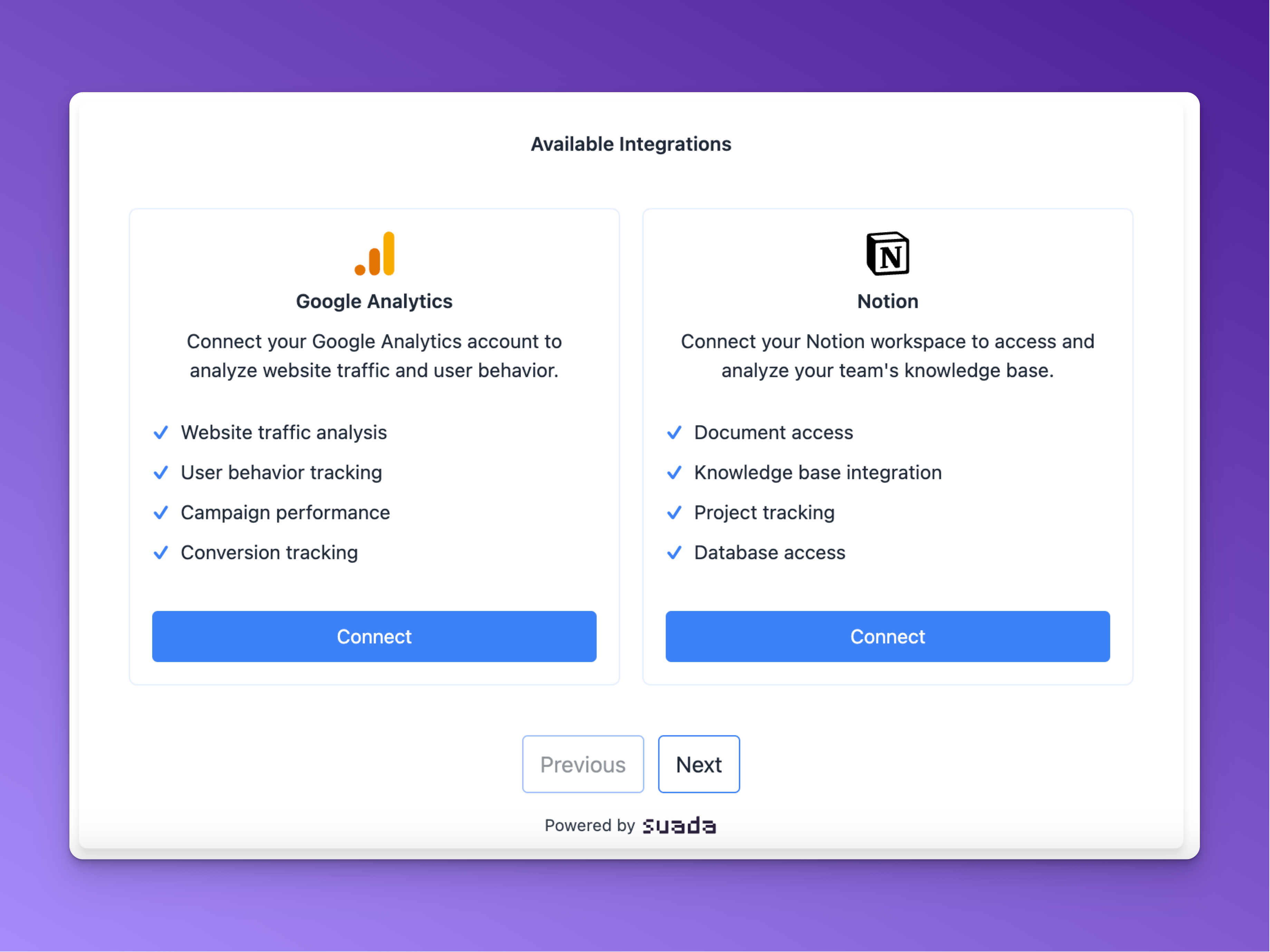Available Frontend SDKs
React SDK
Modern React components with hooks and TypeScript support
- React 18+ support
- Custom hooks for state management
- Styled components integration
- LangChain integration
Next.js SDK
Server-side rendering and App Router support
- Next.js 13+ support
- Server Components
- API route handlers
- Tailwind CSS integration
Angular SDK
Enterprise-ready Angular components and services
- Angular 17.3+ support
- Injectable services
- Standalone components
- TypeScript support
Vue SDK
Vue 3 components with composables
- Vue 3.0+ support
- Composition API
- TypeScript support
- Vite integration
React Native SDK
Native mobile components for iOS and Android
- React Native 0.73+ support
- Deep linking support
- Native UI components
- Expo compatibility
Vanilla JS SDK
Framework-agnostic JavaScript implementation
- No framework dependencies
- Modern browser support
- CDN availability
- UMD/ESM formats
Getting Started
Prerequisites
Before you begin, ensure you have:- A Suada API key
- Node.js 16.0.0 or higher
- A modern web browser
- Your preferred package manager (npm, yarn, or pnpm)
Installation
Choose your preferred SDK and install it:Environment Setup
Set up your environment variables based on your framework:Core Features
🔒 OAuth Integration Flow
The SDKs provide a seamless OAuth integration experience:
-
Initialize Connection
- User clicks connect button
- SDK handles OAuth redirect
- Secure token exchange
-
Authorization
- User authenticates with provider
- Secure callback handling
- Token management
-
Integration Complete
- Success confirmation
- Ready to use
🎨 UI Components
All SDKs provide these core components:Integration Button
A customizable button for connecting services:Integration List
Display and manage connected integrations:Best Practices
Security
- Store API keys in environment variables
- Use HTTPS for all API calls
- Implement proper error handling
- Secure OAuth callback endpoints
- Validate user sessions
Performance
- Lazy load components
- Implement proper cleanup
- Handle offline scenarios
- Optimize network requests
- Use proper caching
Development
- Use TypeScript for type safety
- Follow framework best practices
- Write unit tests
- Keep dependencies updated
- Use proper error boundaries
Common Use Cases
Basic Integration Setup
-
Install SDK
-
Configure Provider
-
Add Components
Framework-Specific Features
Next.js
- Server Components support
- API route handlers
- App Router compatibility
- Tailwind CSS integration
React
- Custom hooks
- Context API integration
- Styled components
- LangChain support
Angular
- Injectable services
- Standalone components
- Dependency injection
- RxJS integration
Vue
- Composition API
- Vite integration
- Vue Router support
- Pinia integration
React Native
- Native UI components
- Deep linking
- Platform-specific optimizations
- Expo compatibility
FAQ
How do I handle OAuth callbacks?
- Set up your callback URL in the Suada dashboard
- Configure the redirect URI in your component
- Handle the callback in your application
How do I debug integration issues?
- Enable debug mode
- Check network requests
- Validate OAuth flow
How do I handle offline scenarios?
- Implement proper error handling
- Use retry mechanisms
- Cache responses
Support & Resources
Documentation
Support
- Email Support: [email protected]